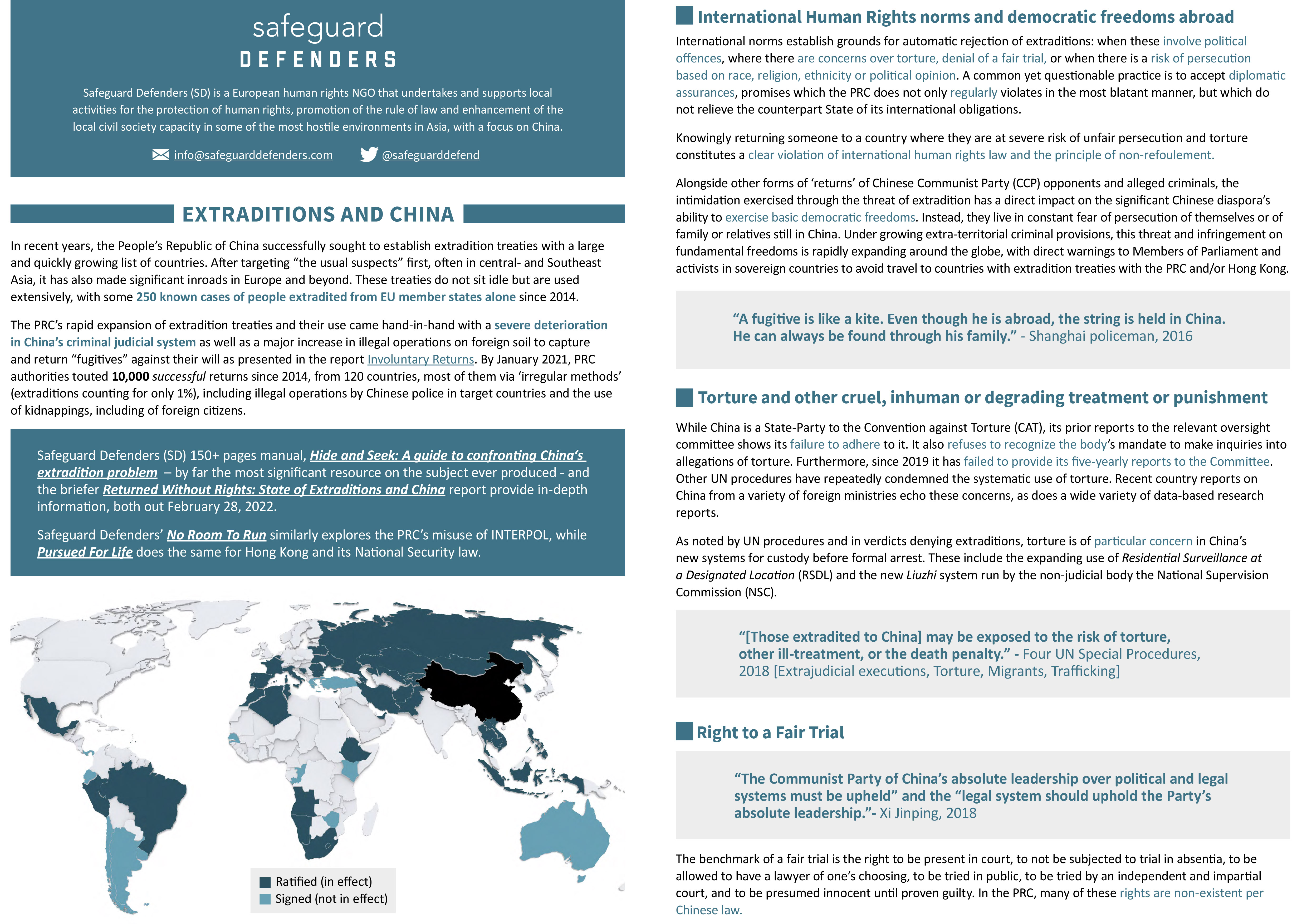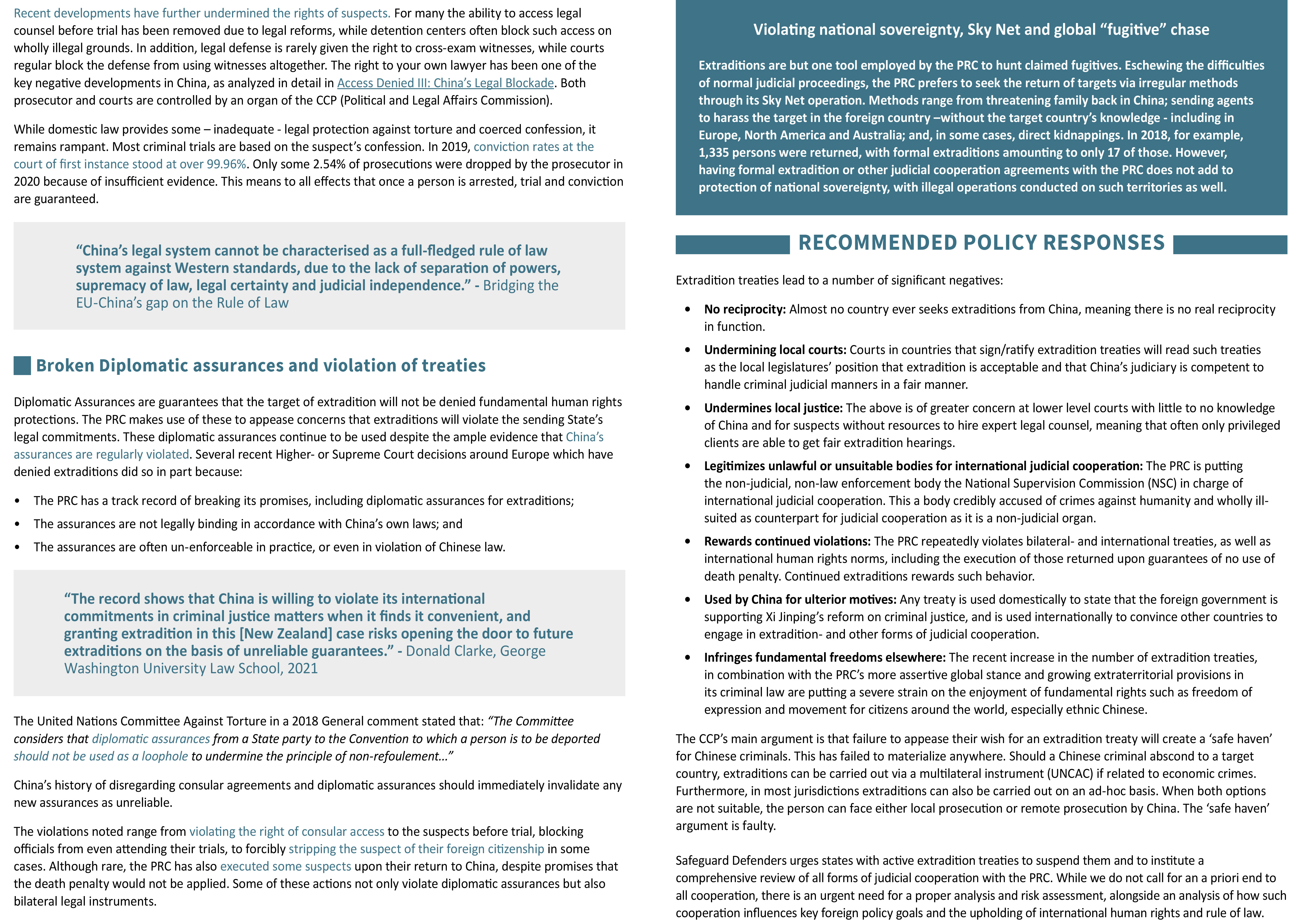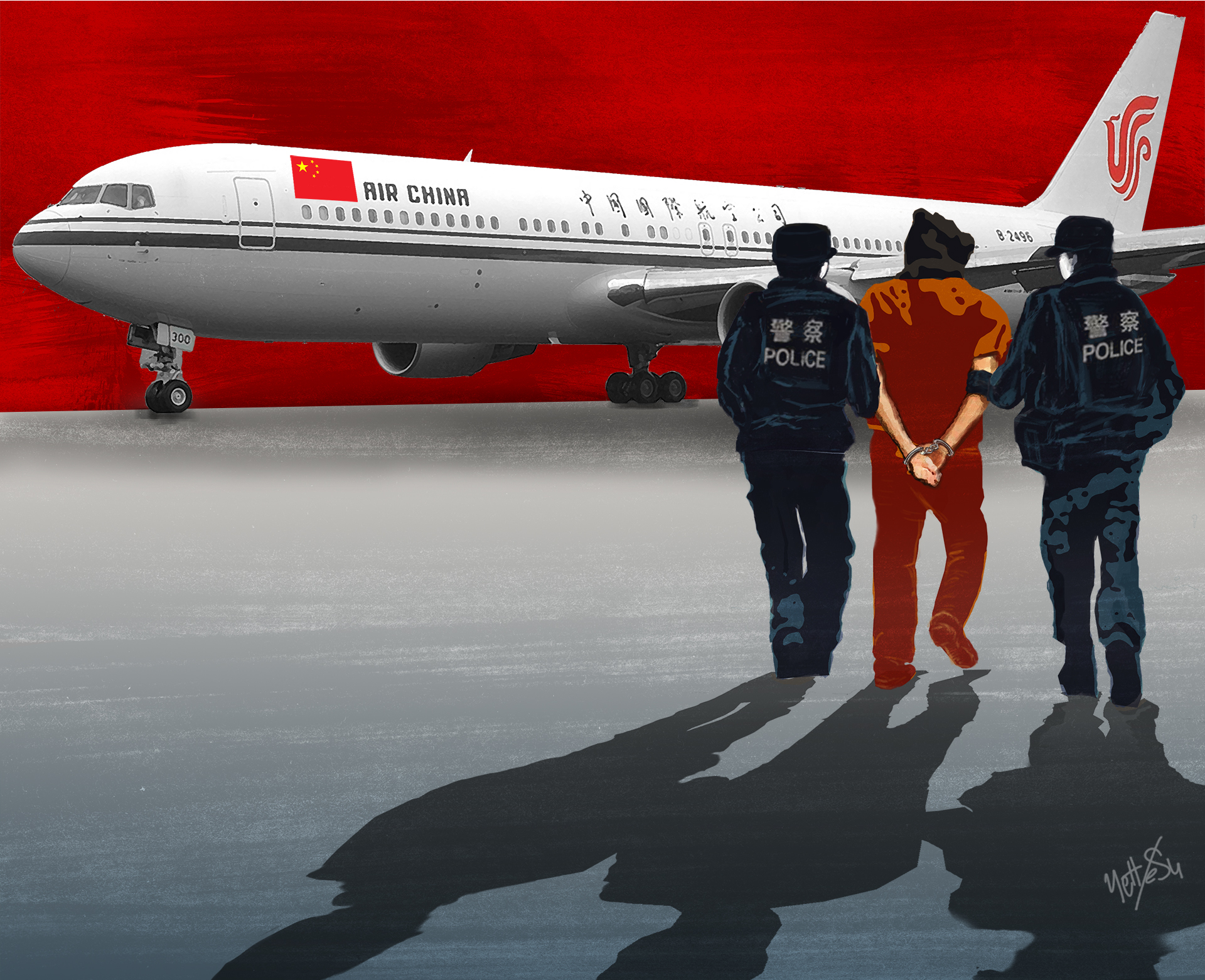Cyprus denies extradition to China in a case illustrating transnational repression acts
UPDATE 2022-12-23:
The district court of Larnaca, Cyprus, issued a verdict today concerning the extradition process of Chinese national Ma Chau, who China wants for economic crimes. It denied the extradition. The judge ruled that the extradition of Ma, who stands accused of economic crimes, would be in violation of article 3 of the European Convention on Human Rights (ECHR) (on Torture and ill-treatment), and pointed out that 'diplomatic assurances' offered by the Chinese State were insufficient to overcome serious risks to the target's human rights.
More strikingly, the court also refused the extradition on the grounds of article 5, due to the significant risk of arbitrary detention and, in a rare instance by a European court, article 6, which guarantees the right to a fair trial, which China, the court held, could not offer.
Safeguard Defenders provided an expert report of the practical operation of the Chinese criminal justice system, and its Director, Peter Dahlin, appeared for the defense at the hearing, as well as in cross-examination with the prosecutor, alongside several well-known experts in Chinese law. The judge declared all witnesses called to the stand as authoritative experts, that the testimony between the different experts was consistent, and took note of the seriousness of the reports provided as the basis for such testimony. The Chinese State sent a delegation to appear for the prosecution, including a professor of law who drafted China's own extradition law, in an appearance that witnesses claim went very poorly.
There is limited likelihood that the State will file for an appeal to the decision and that if such is filed, it is unlikely to overturn the decision due to the strength of the ruling.
Read also: China issues INTERPOL Red Notice against extradition target's wife.
END OF UPDATE
**
Unbeknownst to Cypriot officials, media or European counterparts, a most extraordinary story is developing in the tiny Mediterranean island of Cyprus: a perfect storm of Chinese international long-arm policing, expanded judicial cooperation, and transnational repression (TR) as a direct consequence of Xi Jinping’s signature “anti-corruption” campaign and operation Sky Net. This investigation is released following an article published in the Washington Post today.
Highlights
- In an exemplary showcase of the PRC’s increasing long-arm policing operations, China is committing remarkable resources to secure the extradition of a single Chinese national from Cyprus;
- It is the first extradition case of a Chinese since Cyprus entered into an extradition treaty;
- Since target refused to give in, Chinese arrest warrants show the threats have been executed – three family members of the target living in China have been arrested, while a fourth, the target’s mother, is missing (copies of detention/arrest warrants available on request);
- An arrest warrant was also issued against the target’s wife in Cyprus, while their two children are being denied new passports, leaving them stranded in Cyprus (evidence available);
- Counter to terms of the extradition treaty, Chinese police are taking active steps to undermine an ongoing judicial process and deny the target his right to a fair trial in Cyprus;
- As reported in Involuntary Returns, a legal document from Chinese government shows explicit instructions to the Chinese police on how to use these methods (arresting family in China, delivering threats in foreign countries, luring and entrapment in a third country, as well as kidnappings) to forcefully return so-called “fugitives” (copy of document available on request).
The targets
Chinese police made good on their threats: throughout January and February of this year the list of detained relatives in China kept growing. Moreover, Chinese police issued an arrest warrant for his wife too, and refuses the renewal of their children’s passports, leaving them effectively stranded in Cyprus.
China’s extradition campaign in Europe and long-arm policing globally
Xi Jinping launched his “anti-corruption” campaign shortly after assuming the helm of the Chinese Communist Party, closely followed by the launch of its international arm - Sky Net - an operation which seeks to force the return of claimed fugitives from around the world. Until recently, China had made great strides in expanding its long arm policing efforts, ensuring none would ever feel safe anywhere.
In February of this year, the agency on charge of Sky Net claimed to have returned another 1,273 “fugitives” in 2021, bringing the total of such returns to 10,105 from over 120 countries worldwide. Estimates based on Chinese government data puts 1% of those returned via extraditions, the rest via “alternative” means. Extraditions, however rare in comparison, are key nonetheless, because they provide legitimacy to a legal system in desperate need of such, and so do bilateral extradition treaties.
Transnational Repression: Governments reaching across borders to silence dissent among diasporas and exiles, including through assassinations, illegal deportations, abductions, digital threats, Interpol abuse and family intimidation.
Involuntary Returns: The use of non-traditional, often illegal, means of forcing someone to return to China against their will, most often to face certain imprisonment. Methods range from threatening family back in China, sending agents to intimidate target in host country, to direct kidnappings. Sometimes referred to as IR operations.
Starting in 2019, as the world became increasingly aware of China’s incessant crackdown within its own borders, in Hong Kong and - most notoriously - in the vast western region of Xinjiang, China started facing stiffer resistance to its extradition campaign. While at a heavy price for the individuals involved who have been deprived of their liberty for considerable amounts of time, European courts at varying instances – from local and appeals courts to Supreme Courts - have denied extraditions to China one after another: starting in Sweden in 2019, and followed by the Czech Republic, France, Poland and even Turkey. A recent attempt at extradition from Morocco of Uyghur Idris Hasan, though approved by the local court, is facing stiff resistance from the United Nations as he remains in custody in Morocco.
Enter Cyprus.
The case in Cyprus
When a representative from the Cypriot Ministry of Justice appeared in the above-mentioned case before the court in Larnaca and was questioned about the signing (and later ratification) of said extradition treaty, the response was, at best, embarrassing. The representative could muster only an “I don’t know” to many of the questions, and it became clear no risk assessment whatsoever had been undertaken by Cypriot authorities prior to entering into the agreement. In the end, the defence adopted for signing onto the extradition treaty simply amounted to “other countries have signed them, so why can’t we”. As with other countries entering into such agreements, the notion of upholding the rule of law and fundamental human rights was the last thing considered, if at all. As for the use of this agreement for Cyprus, it has not used it to request any extradition from China. In fact, none of the European countries with extradition agreements with China ever actually uses them. They are purely one-way, for China to use.
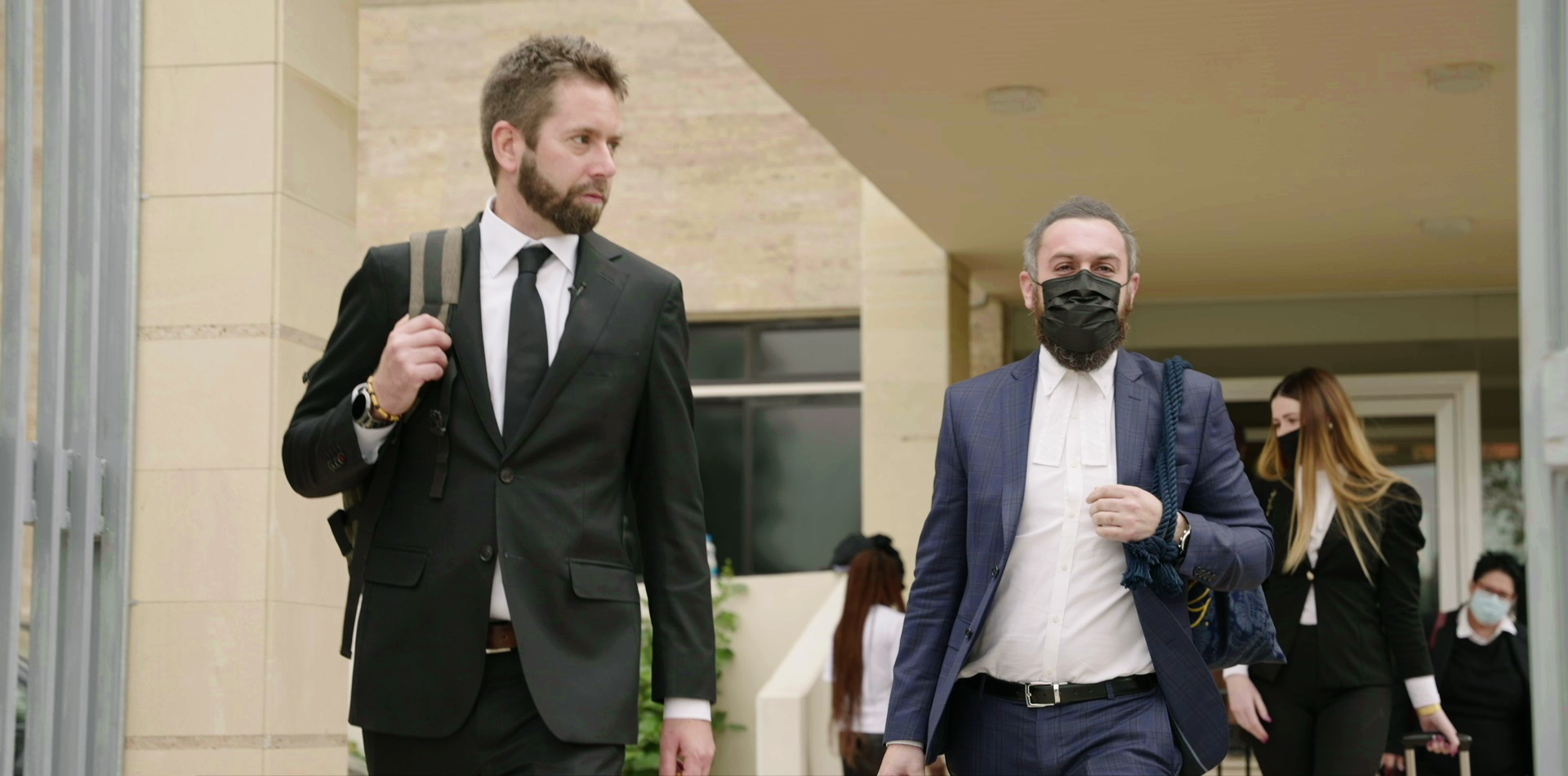
Three months following the warning delivered in front of the Larnaca courthouse, Ma Chao continued to resist the extradition request. As promised, Chinese police took action. On January 28th, Lucy’s sister Li Linghui and her husband Zhang Shourong were detained, and are now formally arrested.
China’s Sky Net 2021 campaign - concluded in February 2022 - claims to have netted 1,273 fugitives. This would bring the total, since launch of operations in spring 2015, to 10,105 people captured via the program. It is estimated, based on partial data for previous years that formal extraditions account for only about 1% of these cases.
Many targets identified by Safeguard Defenders and other human rights organizations in the past are not part of this data. Finally, published numbers only account for those cases which were successful in having the claimed fugitive returned. 60+ specific cases documented by Safeguard Defenders’ report Involuntary Returns showed only a 50% success rate.
On February 23rd, Ma Chao’s defence had several experts appear at trial, in the form of three UK-based professors specializing in Chinese law (all three appeared only upon the condition of confidentiality, despite none of them having family in China). Upon conclusion of their testimony on February 25th, Ma’s father - 62-year-old Ma Shouhe - was also detained. He has now also been arrested. The location of Ma’s mother Shi Lihua is currently unknown and she is believed to have gone into hiding to avoid a similar fate.
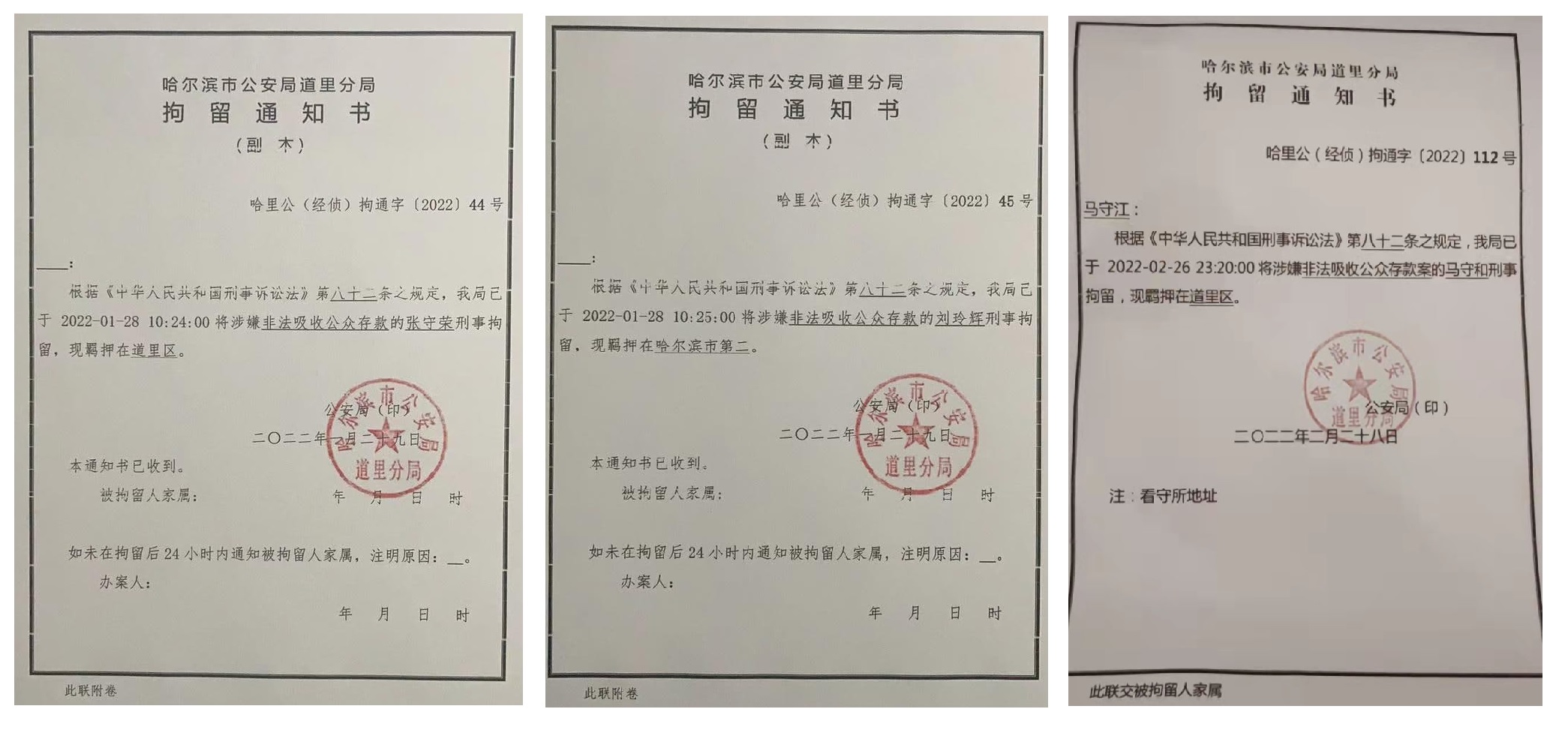 In an almost comical turn of events further highlighting one of the many reasons the Chinese judicial system should not be legitimized through extradition agreements, two of the three detention certificates are illegal even according to Chinese law, as they lack the specific name or address of the detention center where the people are being held.
In an almost comical turn of events further highlighting one of the many reasons the Chinese judicial system should not be legitimized through extradition agreements, two of the three detention certificates are illegal even according to Chinese law, as they lack the specific name or address of the detention center where the people are being held.
Unfortunately, though incredible, nothing in this story is surprising. Long before the current proceeding against Ma Chao began, Chinese police tried to convince him to return “voluntarily” through actions mirroring those described in Safeguard Defenders’ report “Involuntary Returns”. Only when those attempts failed did Chinese authorities press forward with the extradition request.
Yet as his defence proved more resistant than expected and a denial of the request seems likely, Chinese agencies once again turned to their irregular methods by going after family members back in China to force the target to return “voluntarily”.
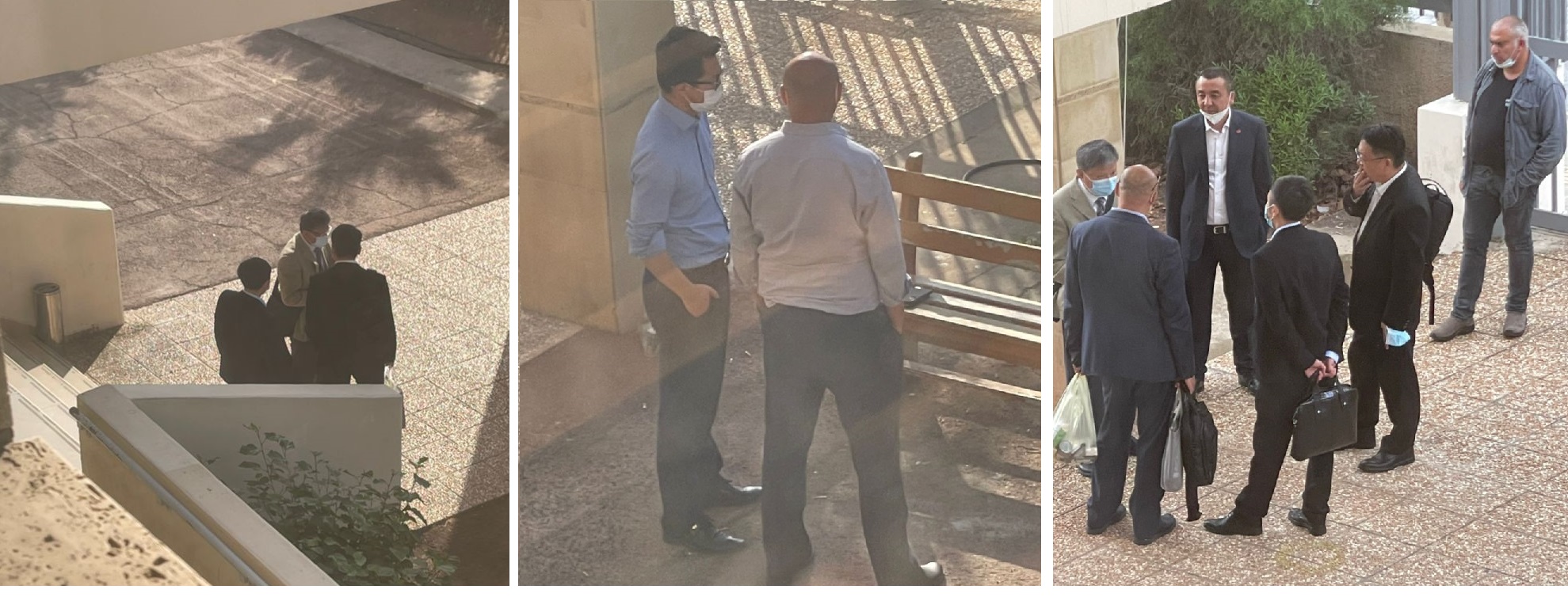
This is not an isolated case, but rather the blueprint for an intricate part of China’s growing transnational repression. New cases are appearing on our radar all the time, rapidly growing our database. All of them represent similar traits. Cases are in five figures (10,000+).
Yu Hao, a Chinese man who committed suicide in a Warsaw detention centre after spending close to two years waiting for his extradition hearing, was subject to similar actions. His wife chose to relent and return to China “voluntarily”. Chen Yuzhen, then in South Korea but now in the U.S., faced pressure to return, “or else”. In the United States, the Justice Department this month charged five men with acting as agents to spy on and intimidate Chinese citizens, similar to a number of people charged last year in an elaborate Sky Net operation to force the return of a wanted man, which included threats, surveillance and the arrest of relatives in China. In Canada, Chinese IR operations continue as well, with Zhang Yan being targeted to return as Chinese police use his arrested father as a tool.
In France, the wife of former INTERPOL chairman Meng Hongwei, - who was disappeared and later imprisoned - is now living under police protection and says she has been the target of not one but two kidnapping attempts. A French journalist, speaking anonymously, says French security services have recently identified two others targeted in similar fashion. In Poland, a Taiwanese citizen has now been detained since 2018, and still awaits his extradition hearing to mainland China despite being Taiwanese.
In fact, Ma Chao is not even alone in Cyprus. Last year we learned that two other Chinese nationals left Cyprus for the UK, not feeling safe following IR operations against them, and this February media reported on two other Chinese nationals – mother, 61, and son, 39 - who are fighting extradition to China in Paphos, Cyprus.
For Cyprus: what is happening with the case of Ma is not only troublesome, but a blatant attempt at undermining Cypriot national judicial sovereignty. For a parliament that sleepwalked into ratifying this agreement, it should give pause for thought.
Going forward
After successive failures across Europe to secure the return of claimed fugitives, starting with Sweden in 2019 and snowballing into cases across various European countries, China desperately needs a win. From what Safeguard Defenders can observe, in comparison to other cases, China is committing unprecedented resources to secure this extradition. Cyprus, it seems, must be the turning point for China in its losing streak.
The exposure by Safeguard Defenders of China’s expansive “Involuntary Returns” operations shocked public opinion around the world and caused Members of Parliaments in various countries to raise the issue.
Between 2021 and 2022, with overwhelming majorities the European Parliament has repeatedly called on the European Council to suspend all bilateral extradition treaties with mainland China in the EU. The European Council had made a similar move following the imposition of the National Security Law on Hong Kong expressly citing the added risk of extradition to mainland China was cited as a ground for the decision. It is highly ironic therefore that ten European Member States still maintain such an extradition treaty with the PRC themselves. As frequently highlighted by activists and exiled dissidents, the ongoing number of cases within the EU in combination with the PRC’s announced expansion of operation Sky Net, represent an ongoing threat to fundamental freedoms within the EU itself, actively casting a net of political terror across the Union to silence critics of the regime.
On March 21st, the U.S. State Department announced visa restrictions on those responsible or complicit in the PRC’s long-arm policing efforts.
China just launched its Sky Net operations for 2022 on March 3rd and the work report presented to the PRC’s Congress for Sky Net 2021 showed how the campaign continues unabated. At the Congress, the head of Sky Net vowed to further expand its long-arm policing globally 2022 and onwards.
Safeguard Defenders factsheet on Extraditions and China (pdf here).
